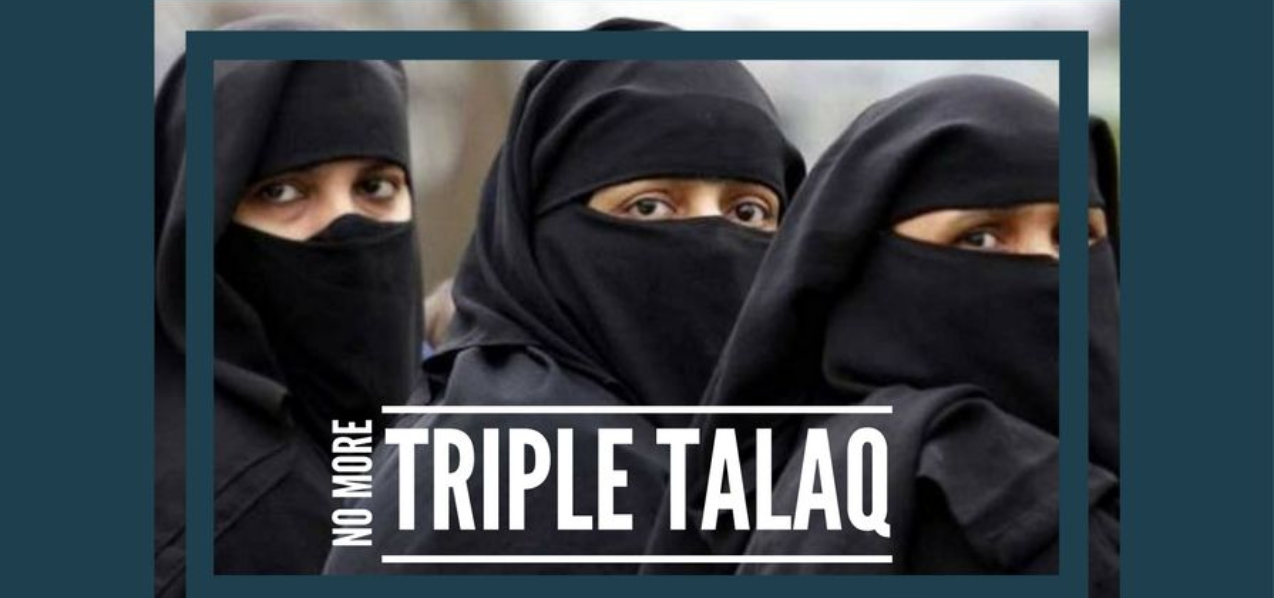
TRIPLE TALAQ
Qur'an 4:34 states. Men are in charge of women because they invest their possessions (for the sustenance of women) and because Allah has created one of them superior to the other, therefore decent women are the obedient, keeping in secret what Allah has guarded.Based only on the verses above, women have been portrayed as submissive creatures. They have been represented as being helpless under the total dominance of men. Men and women are equal in the eyes of God, as stated in the Quran (74:38). In which it is stated that "every soul will be (held) in pledge for its deeds." However, continuously reading Quranic passages has some serious problems. The Supreme Court rendered a significant ruling regarding the constitutionality of "Triple Talaq," often referred to as "Talaq-e-Biddat"
Where Nikah Halala may be a hone in which a separated lady must wed and look for a separate some time recently remarrying her spouse and from a moment spouse some time recently she can go back to her to begin with spouse. And polygamy may be a hone which allows Muslim men to have more than one spouse. It is Talak-ul-Biddat that's the subject of talk about. Usually known as Triple Talaq, and it was challenged in this case some time recently the Preeminent Court. In Shias, be that as it may, Talak-ul-biddat is illegal. In any case, the Hanafi School considers it to be corrupt, in spite of the reality that it is taken after by a huge Muslim populace. The Spouse does not take after the allowed shape of Talaq, talaq-ul-sunnat, and he does not hold up for the iddat time or the abstention from sexual intercut in this sort of Talaq. The Islamic patriarchal society concocted this escape route to halt their marriage. In this frame of separate, the spouse divorces his spouse three times in a single sentence. The most issue with this shape of talaq is that, not at all like its reciprocals, it is irreversible.
The Court in this case was essentially concerned with the method of triple talaq. The hone of triple talaq was pronounced illicit by the Incomparable Court in Admirable 2017 by a 3:2 vote. Equity Nariman composed the lion's share conclusion for himself and on sake of Equity Lalit, whereas Equity Joseph concurred with the larger part supposition. Chief Equity Kehar composed the minority conclusion for himself and on sake of Equity Nazeer. In spite of the fact that the larger part of the bench decided that Triple Talaq isn't an vital devout hone after much talk about, the minority seat decided that it is. The state cannot take absent a person's crucial devout hone beneath Article 25 of the Structure. As a result, in the event that a practise is self-assertive and not an fundamental devout hone, it'll drop beneath the u/a 25 exclusion. As a result, the complete wrangle about spun around whether or not the hone is an critical Islamic devout hone.
On February 16, 2017, the Court asked composed entries from Shayara Bano, the Union of India, different women's rights associations, and the All-India Muslim Individual Law Board (AIMPLB) on the issues of talaq-e-bidat, nikah-halala, and polygamy. Ms Bano's contention that these exercises are illegal was sponsored by the Union of India and women's rights associations such as Bebaak Collective and Bhartiya Muslim Mahila Andolan (BMMA). The AIMPLB has contended that uncodified Muslim individual law isn't subject to legal audit under the Structure, which these are principal Islamic hones secured beneath Article 25 of the Structure.
The Court in this case was essentially concerned with the method of triple talaq. The hone of triple talaq was announced unlawful by the Preeminent Court in Admirable 2017 by a 3:2 vote. Equity Nariman composed the lion's share supposition for himself and on sake of Equity Lalit, whereas Equity Joseph concurred with the larger part supposition. Chief Equity Kehar composed the minority supposition for himself and on sake of Equity Nazeer. In spite of the fact that the larger part of the bench decided that Triple Talaq isn't an vital devout hone after much talk about, the minority seat decided that it is. The state cannot take absent a person's essential devout hone beneath Article 25 of the Structure. As a result, on the off chance that a practise is subjective and not an fundamental devout hone, it'll drop beneath the u/a 25 exclusion. As a result, the complete talk about rotated around whether or not the hone is an critical Islamic devout hone.
As a result, agreeing to the lion's share, the Triple Talaqor Talaq-e-biddat isn't secured by Article 25's exception, i.e., the court decided that the hone isn't an necessarily component of Islamic religion. Whereas it is polished by the Hanafi School, the court advocated its position by expressing that it is considered shameless in it. Triple Talaq is contradictory with the basic principles of the Quran, and everything that's inconsistent with the Quran is contradictory with Shariat. As a result, what is awful in philosophy cannot be great in law.
Agreeing to the common supposition, triple talaq is unlawful beneath Article 14 and Article 13 of the Structure (1). The Muslim Individual Law (Shariat) Application Act, 1937, had authorized the hone as a matter of individual law, concurring to the Court. The Court clarified that “arbitrary activity would essentially involve invalidation of equality” and decided that, since triple talaq stipulates that “the conjugal tie can be broken capriciously without any exertion at compromise in arrange to protect it,” this assertion damages Article 14. The Court decided that the 1937 Act is illegal to the degree that it acknowledges and implements triple talaq, citing Article 13(1) of the Structure, which states that all laws in impact quickly some time recently the graduation of the current Structure (counting the 1937 Act) are void to the degree that they are conflicting with the Constitution's essential rights. The Court also considered whether triple talaq is secured beneath Article 25, but decided that it isn't fundamental for the hone of Islam after investigating pertinent points of reference and Islamic grant.

DIGITAL-TAX IN INDIA
Until date, non-resident businesses doing trade in India and having commercial connections in India were excluded from the Indian charge framework due to the burdening controls laid out in Article 7 of the Twofold Charge Evasion Assention. There was no such arrangement that permitted the Indian government to gather charges from overseas organizations that did not have a lasting foundation in India due to burdening limitations sketched out in Article 7 of the Twofold Tax collection Evasion Assention. Agreeing to the DTAA, a organization will be subject to Indian taxation only in case it incorporates a changeless foundation in India. The Central Board of Coordinate Charges presented the “Threshold for the Reason of Critical Financial Presence” beneath Salary Charge Rules, 2021 on May 3, 2021, by Notice No. 41 /2021/ F. No. 370142/11/2018-TPL. Companies who have no physical nearness in India but have harvested significant monetary benefits from the Indian showcase will presently be subject to the Indian charge framework.
What is DTAA
The Twofold Charge Evasion Assention (DTAA) may be a arrangement marked between governments to dodge paying twofold tax collection on the same income. Overseas enterprises regularly begin their operations in numerous countries without having changeless nearness there. The essential objective of this understanding is to advance globalization by dispensing with twofold tax assessment. With the headway of innovation in later decades, organizations have started a considerable amount of commerce and earned a expansive fortune by having a lasting foundation.
What is SEP
The Back Act was changed in 2020, and Clarification 2A of Segment 9 of the Income-tax Act was supplanted, and the taking after was included- For the expulsion of questions, it is therefore announced that the critical financial nearness of a non-resident in India might constitute “business connection” in India and “significant financial presence” for this reason, should cruel any exchange in regard of any products, administrations or property carried out by a nonresident in India counting arrangement of download of information or program in India in case the total of installments emerging from such exchange or exchanges amid the past year surpasses the sum as may be endorsed; or Precise and persistent requesting of its commerce exercises or locks in in interaction with such number of clients as may be endorsed, in India through advanced implies. The alteration moreover cleared that indeed in case taking after condition are not satisfied, the Critical Financial Nearness will be recognized. The understanding for such exchanges or exercises is entered in India; or the non-resident includes a home or put of trade in India; or the non-resident renders administrations in India
The Clarification 3A was embedded to clear any question with respect to the scope of salary which is able be included within the “Income inferable to the operations carried out in India” i.e, such notice which targets a client who dwells in India or a client who gets to the promotion through web convention address found in India; deal of information collected from a individual who dwells in India or from a individual who employments web convention address found in India; and deal of products or administrations utilizing information collected from a individual who dwells in India or from a individual who employments web convention address found in India.”.
Presently, the companies, which has the sum of total of installments emerging from exchange or exchanges needs to be two crore rupees and three lakhs clients, will need to pay 2% computerized charge or Equalization Exact and will come into drive from April, 2022.
Stand of data after introduction of ‘Threshold of SEP’
After considering open input, India chosen to keep the suggested edge moo, with the entire sum of installments being two crores and the number of employments being three lakhs. India has presently actualized SEP and passed the model for Significant Economic Presence. The Indian government will have to be renegotiate the “Double Assess Shirking Agreement” with the nations. Since in the event that the assentions are not renegotiated, corporations may confront twofold tax collection, which would be a total infringement of the "Twofold Assess Shirking Assention." It'll be troublesome for the government since huge organizations have as of now started to meet with their domestic nations in arrange to evade the Advanced Charge in India.
As a result, the government's show key obligation is to construct a common ground with the domestic nations of undertakings so that a sensible amount of wage may be earned from these e-commerce ventures.




